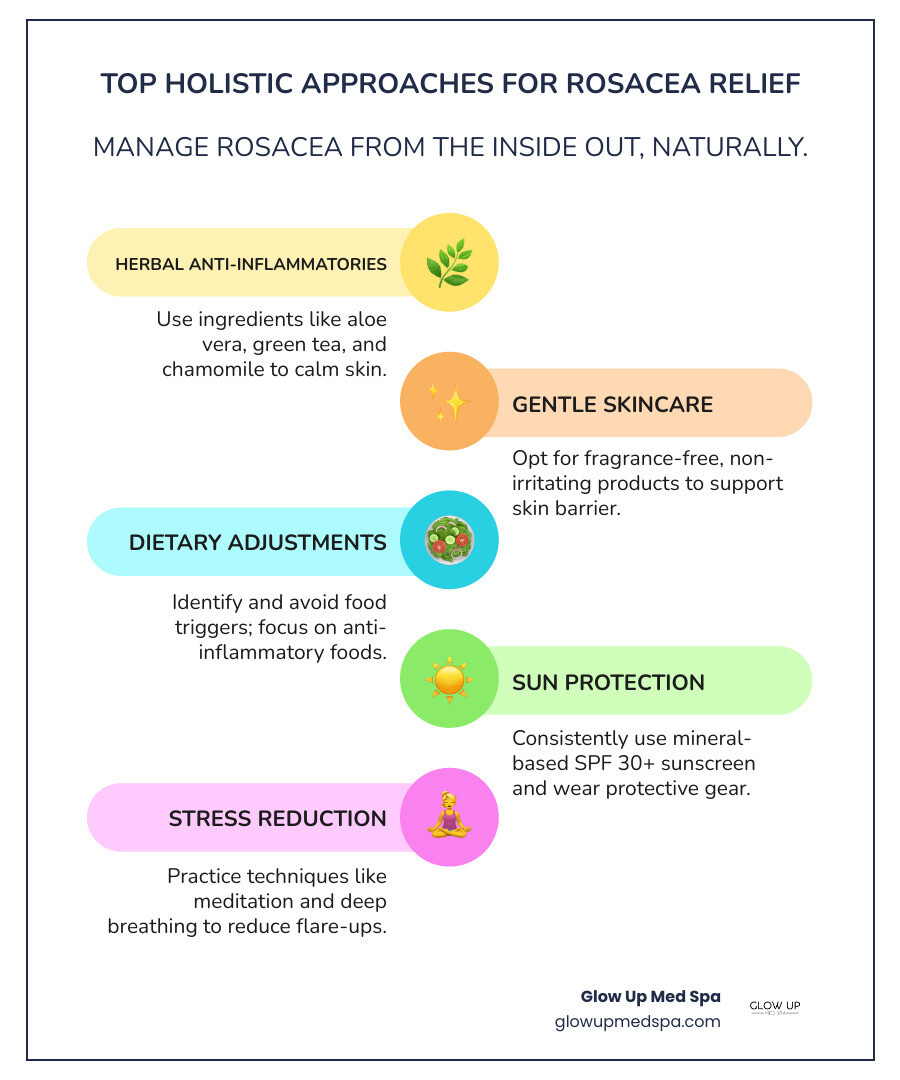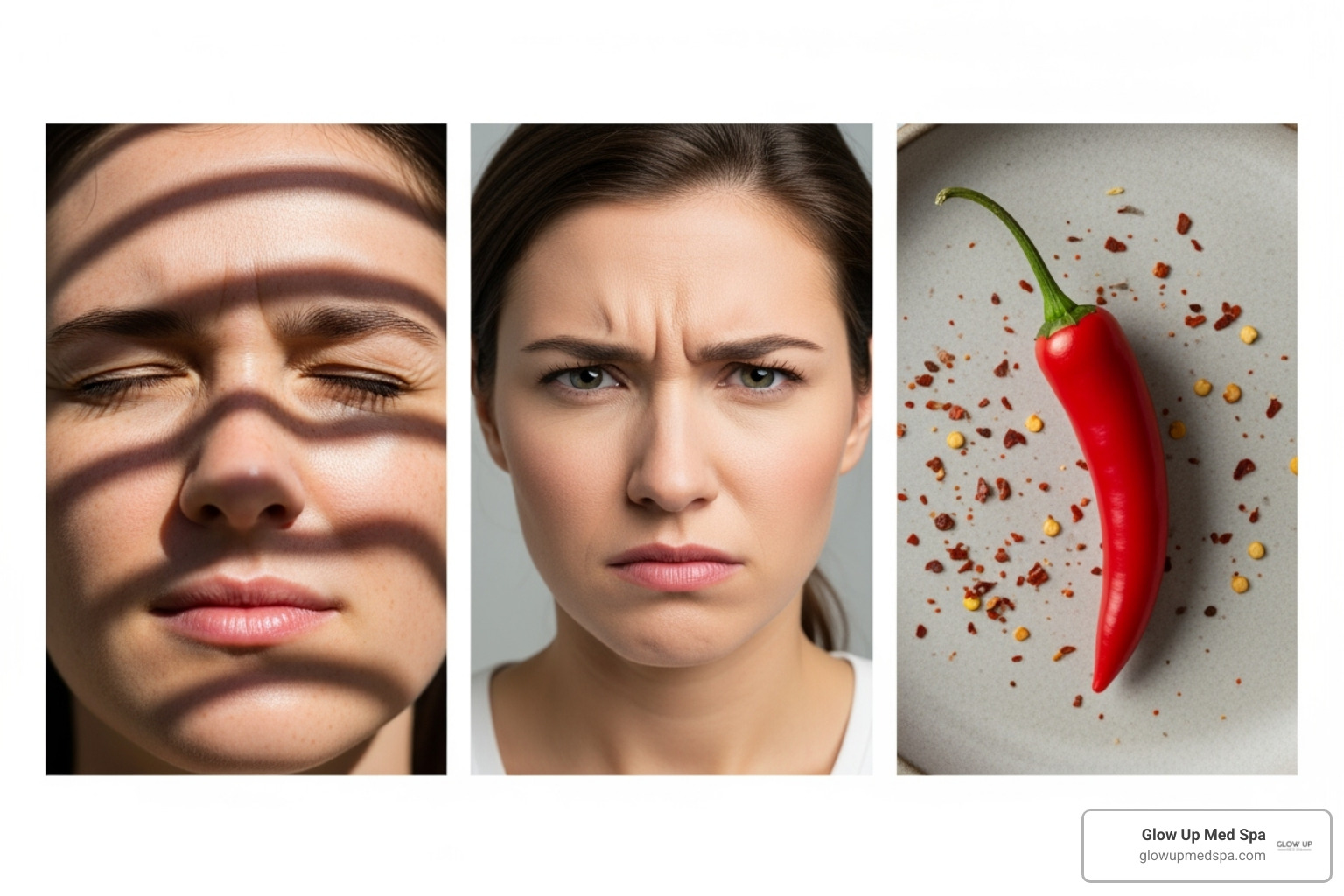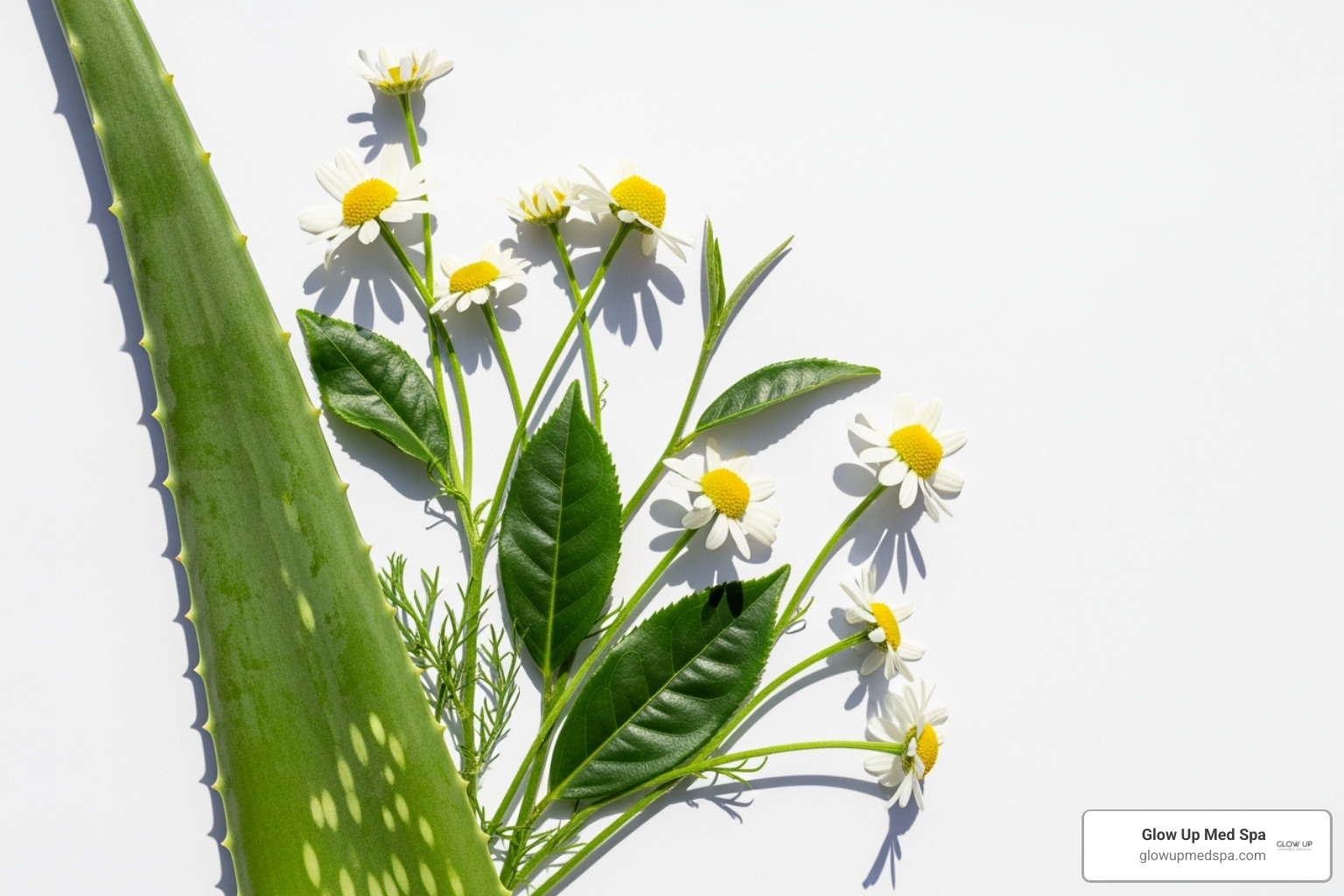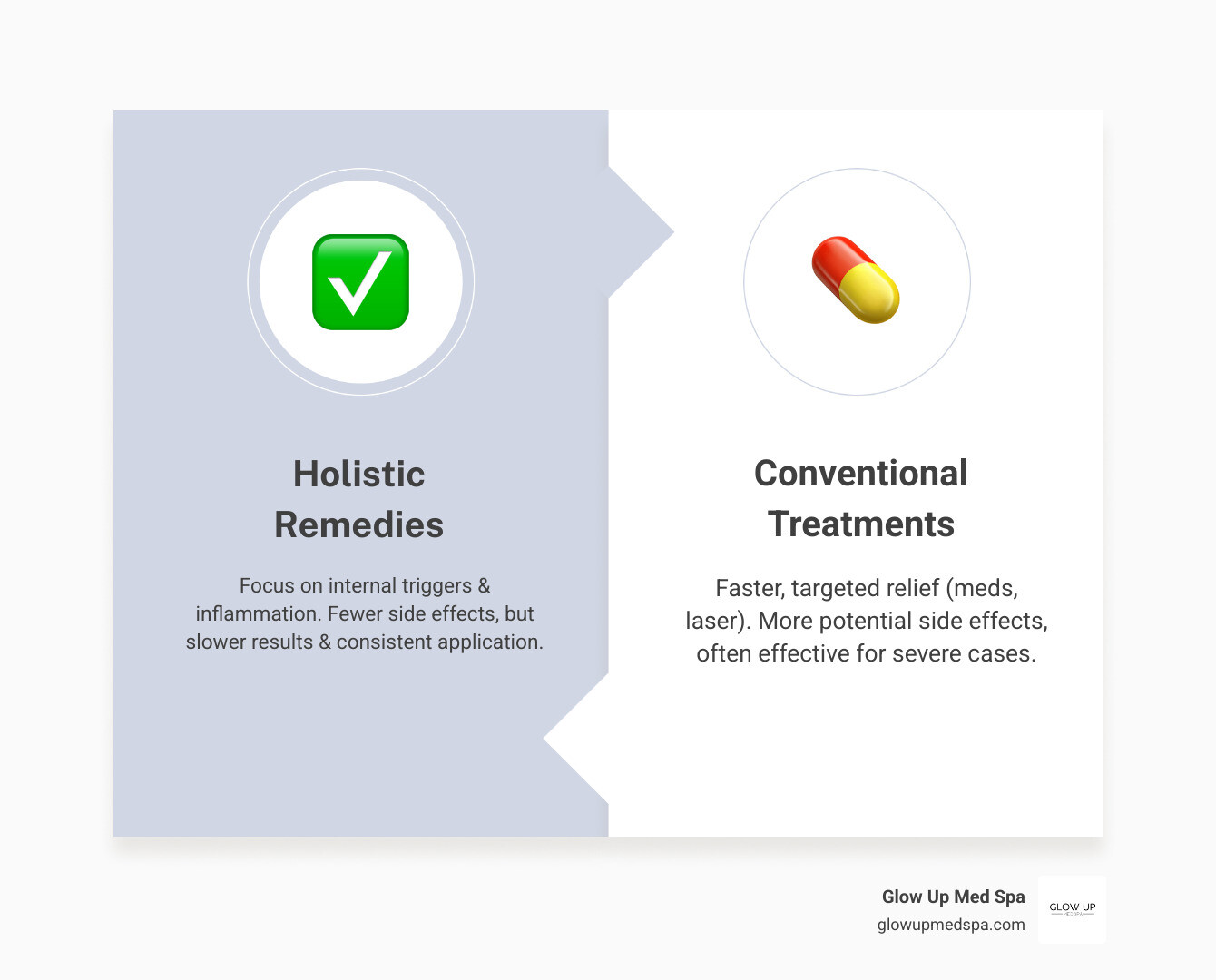
Calm Your Complexion Naturally with These Holistic Rosacea Remedies
Embracing a Holistic Approach to Rosacea Relief
If you're seeking holistic remedies for rosacea, you're looking for more than just quick fixes. You want to understand and manage this chronic skin condition naturally.
Here are some top holistic approaches for rosacea:
- Herbal Anti-Inflammatories: Use ingredients like aloe vera, green tea, and chamomile.
- Gentle Skincare: Opt for fragrance-free, non-irritating products.
- Dietary Adjustments: Identify and avoid food triggers, focus on anti-inflammatory foods.
- Sun Protection: Consistently use mineral-based SPF 30+ sunscreen and wear protective gear.
- Stress Reduction: Practice techniques like meditation and deep breathing.
Rosacea is more than just flushed skin. It's a chronic condition marked by redness, flushing, and sometimes bumps or visible blood vessels. It often brings discomfort and irritation. As many as 69 percent of people with rosacea report emotional side effects like embarrassment and anxiety. You wish your skin could just Chill! when unexpected triggers hit.
A holistic approach looks at the whole person. It aims to find the root causes of flare-ups. This means managing rosacea from the inside out, not just treating symptoms.
I’m Hailee Goldberg, Clinical Manager at Glow Up MedSpa. My experience in clinical skincare and non-surgical aesthetic treatments emphasizes personalized care, including exploring holistic remedies for rosacea. I'm passionate about empowering individuals to find confidence through self-care and effective beauty practices.

Understanding Rosacea: Symptoms, Causes, and Triggers
Rosacea is a chronic inflammatory skin condition primarily affecting the face, but it can also spread to the chest, back, ears, and even the eyes. It's not just a passing blush; it's a persistent, often frustrating, condition that can significantly impact daily life.
Common symptoms include persistent redness, particularly on the cheeks and nose, which can extend to the forehead and chin. This is often accompanied by flushing, where the skin suddenly turns red with a feeling of heat. Many also experience small, red bumps or pimples resembling acne, and visible blood vessels (telangiectasias). In severe cases, especially in men, the skin can thicken and enlarge around the nose, a condition called rhinophyma.
More than half of people with rosacea also have issues with their eyes, a condition known as ocular rosacea. This can manifest as red, irritated, watery, or dry eyes, a gritty sensation, sensitivity to light, and even blurred vision. It's important not to overlook these symptoms, as ocular rosacea can become quite aggravating.

While the exact cause of rosacea isn't fully understood, research points to a complex interplay of factors. It's believed to involve abnormal immunity, neurovascular dysregulation (problems with blood vessels and nerves), oxidative stress, and even microscopic mites called Demodex that live on the skin. Some studies suggest rosacea may be an immune-mediated disease, with increased activity of innate immune receptors in the skin. Genetic predisposition also plays a role, as rosacea often runs in families.
The triggers that can cause rosacea to flare up vary greatly from person to person, but some are very common:
- Sun Exposure: This is a big one! Sun exposure is named a top trigger for rosacea by 81 percent of respondents in a National Rosacea Society survey. UV radiation can stimulate immune responses and worsen inflammation.
- Emotional Stress: Stress can lower your immune response and raise blood pressure, both of which can exacerbate rosacea symptoms, leading to flare-ups and increased facial redness.
- Extreme Temperatures: Both hot and cold weather, especially wind, can trigger a flare-up.
- Hot Beverages and Spicy Foods: The heat from these can cause blood vessels to dilate, leading to flushing.
- Alcohol Consumption: Alcohol is a well-known vasodilator, meaning it widens blood vessels, which can immediately trigger redness.
- Strenuous Exercise: The increase in body temperature and blood flow can cause flushing.
- Certain Skincare Products: Harsh cleansers, exfoliants, and products containing irritants like alcohol, witch hazel, fragrance, menthol, or eucalyptus can aggravate sensitive rosacea skin.
Identifying your personal triggers is a crucial step in managing rosacea holistically. We encourage keeping a symptom diary to track what might be causing your flare-ups.
For more detailed information on rosacea symptoms and causes, you can explore resources like this guide on rosacea causes.
Soothing Topical Holistic Remedies for Rosacea
When it comes to managing rosacea, what we put on our skin is just as important as what we put in our bodies. Think of your skin as a delicate flower that needs gentle care. Gentle topical holistic remedies for rosacea can offer wonderful relief. They work by calming inflammation, easing redness, and giving your skin's natural barrier the support it truly needs. We love to focus on ingredients that are naturally anti-inflammatory, full of antioxidants, and super soothing.
Calming Botanicals and Plant-Based Gels
These natural wonders offer a gentle touch that sensitive, reactive skin will absolutely adore:
-
That cool, soothing feeling? That's Aloe Vera at work! This plant's gel is famous for its cooling, anti-inflammatory, and moisturizing powers. A recent 2024 review of studies even confirmed aloe vera as a powerful antioxidant, antimicrobial, and anti-inflammatory hero. We suggest applying pure aloe vera gel directly to any red, irritated areas for a wonderfully soothing effect.
-
Think of a warm cup of chamomile tea... now imagine that same comfort for your skin! Chamomile is a gentle herb known for its calming and anti-inflammatory magic. Studies have shown chamomile can bring hydrating benefits that help reduce skin inflammation. You can apply cooled chamomile tea bags to affected areas to soothe discomfort and itchiness during a flare-up. Or, look for skincare products that contain chamomile extract for your daily routine. You can explore more scientific research on chamomile's benefits right here.
-
Beyond being a refreshing drink, Green Tea is packed with amazing antioxidants and anti-inflammatory compounds. Since sun exposure is a major rosacea trigger, it's great to know that studies have analyzed green tea's effect on providing ultraviolet (UV) protection for skin. You can apply cooled green tea bags as a compress or use skincare products that feature green tea extract. It may also help reduce redness linked to sun exposure.
-
Colloidal Oatmeal is a classic for sensitive skin, and for good reason! It acts as a gentle cleanser, moisturizer, and anti-inflammatory all in one. It can even form a protective barrier on your skin, which helps reduce water loss and strengthens your skin's natural defenses. To use it, simply mix finely ground oatmeal with water to create a paste. Apply it as a mask for 15-20 minutes to calm inflamed skin and lessen irritation. It can also be a super gentle exfoliant without causing any irritation.
-
Licorice Root Extract, especially a component called licochalcone A, has shown real promise in making skin less sensitive, reducing swelling, easing itchiness, and calming redness. It's even been compared favorably to conventional treatments like azelaic acid and metronidazole for facial redness, making it a powerful natural ally.
-
Last but not least, meet Niacinamide, also known as Vitamin B3. This powerhouse ingredient is fantastic for boosting skin moisture, improving barrier function, and reducing inflammation. It's especially good at preventing and relieving that flushing feeling often associated with rosacea. Look for creams or serums that proudly feature niacinamide.

Powerful Natural Oils and Honeys for Holistic Rosacea Care
Certain natural oils and honeys offer unique benefits for rosacea-prone skin. They provide much-needed moisture, offer antimicrobial action, and deliver fantastic anti-inflammatory support.
-
Let's talk about the "super-honeys" from New Zealand: Manuka and Kanuka Honey. These special honeys are celebrated for their strong antibacterial, anti-inflammatory, and moisture-retaining properties. A 2015 study on Kanuka honey for rosacea even showed promising results in improving rosacea symptoms. Raw, all-natural honey, especially Manuka or Kanuka, can be applied to affected skin to help balance its bacterial health, reduce redness, and hold onto essential moisture.
-
Tea Tree Oil (TTO) has both anti-inflammatory and antimicrobial properties. It's especially noted for being effective against Demodex mites, which some research links to rosacea inflammation. A 2022 study found that six different concentrations of tea tree oil killed Demodex mites at similar speeds to permethrin. If you suspect these tiny mites are playing a role in your rosacea, diluted TTO might be helpful.
-
While popular for its calming aroma, therapeutic-grade Lavender Oil also possesses anti-inflammatory properties that can soothe irritated skin. Joel Schlessinger, MD, a respected expert, even suggests that if you had to choose just one naturally soothing ingredient, lavender would be your best bet.
Important Note on Essential Oils: Essential oils are incredibly potent! They must always be diluted in a carrier oil before you apply them to your skin. This is super important to avoid irritation.
Here's a list of commonly used carrier oils:
- Jojoba oil
- Sweet almond oil
- Grapeseed oil
- Rosehip seed oil
- Coconut oil (though use with caution for rosacea, as we'll discuss later)
Patch Testing Importance: Before you try any new topical remedy, especially essential oils or a new product, please perform a patch test. Just put a tiny bit on a small, hidden area of your skin (like behind your ear or on your inner forearm). Then, wait 24-48 hours to check for any unwelcome reactions like redness, itching, or irritation. This is a crucial step in our holistic approach to ensure your safety and prevent any unwanted flare-ups.
The Role of Diet and Lifestyle in Managing Rosacea
Managing rosacea isn't just about what you put on your skin. It's deeply connected to your diet and daily habits. A truly holistic approach to rosacea understands that our overall health greatly impacts our skin's well-being.
An Anti-Inflammatory Diet for Rosacea
The old saying, "you are what you eat," is especially true for those with rosacea. Many believe that certain food allergies or sensitivities can make rosacea worse. That's why figuring out your personal food triggers is a key part of holistic remedies for rosacea. We suggest keeping a simple symptom diary. Just note down what you eat and how your skin reacts. This helps you spot exactly what might be causing your flare-ups.
Some common food triggers for rosacea include:
- Spicy foods: The heat from ingredients like chili peppers can make blood vessels expand and lead to flushing.
- Alcohol: Especially red wine, can be a big trigger. It widens blood vessels, causing redness.
- Foods with cinnamaldehyde: Things like cinnamon, tomatoes, citrus fruits, and chocolate can sometimes cause reactions in sensitive people.
- Hot beverages: It's the heat itself, not just caffeine, that can bring on flushing.
- Histamine-rich foods: Cheeses, ciders, vinegar, some Asian foods, and processed meats can be problematic for some. Experts also note that corn, egg, and wheat allergies are common in people with rosacea.
But don't worry, there's plenty you can enjoy! Focus on an anti-inflammatory diet. Think of foods that cool your body and ease inflammation. Load up on Omega-3 fatty acids found in fatty fish like salmon, or plant-based sources like flaxseeds and walnuts. These are inflammation-fighting powerhouses! Pile your plate with green vegetables such as spinach, kale, and hydrating cucumbers. Don't forget soothing fruits like sweet apples, pears, watermelon, and creamy avocado.
Spice things up (the right way!) with turmeric, a known anti-inflammatory that can help with painful rosacea symptoms. And remember your gut! Probiotics from foods like yogurt, kefir, and fermented veggies are crucial. About 70% of your immune system is in your gut. So, a healthy gut microbiome can really help your skin. Some initial studies also point to zinc as a helpful mineral for reducing inflammation.
Essential Lifestyle Adjustments for Holistic Rosacea Management
Beyond what you eat, several lifestyle changes can greatly help manage rosacea and reduce flare-ups.

-
Sun Protection: We can't say this enough: sun exposure is a major trigger. Wear a broad-spectrum sunscreen with an SPF of 30 or higher daily, even on cloudy days. Mineral-based sunscreens with zinc oxide or titanium dioxide are usually best for sensitive skin. Also, wear wide-brimmed hats and seek shade, especially during peak sun hours (10 a.m. to 4 p.m.). Some sunscreens even have a tint to help hide redness.
-
Gentle Skincare Routine: Your skin barrier is already delicate with rosacea. So, harsh products are a definite no-go. Use gentle, non-soap cleansers twice a day. Always choose fragrance-free, non-comedogenic products made for sensitive skin. Avoid harsh exfoliants, astringents, and rough scrubbing. Lukewarm water is best for cleansing, as extreme temperatures can cause flushing. Consistency is key; stick to a routine and avoid changing products too often.
-
Stress Management: Stress is a known trigger for rosacea flare-ups. Learning to handle stress effectively is a vital part of holistic remedies for rosacea. Simple techniques like meditation, deep breathing exercises, and yoga can help you relax and reduce inflammation. Even just walking in nature or enjoying your hobbies can significantly lower stress.
-
Adequate Sleep: Getting enough good, restorative sleep supports your overall health. It helps your body repair itself, which can really improve skin health and reduce inflammation.
By actively managing these lifestyle factors, you can create a more stable environment for your skin. This helps reduce how often and how severely your rosacea flares up.
Natural vs. Medical Treatments: A Balanced Approach
You’ve been exploring some amazing holistic remedies for rosacea, and that’s fantastic! Now, let’s talk about how these natural wonders fit into the bigger picture of managing rosacea. Think of it like building a supportive team for your skin. Natural remedies can be incredibly powerful partners, but sometimes, a medical expert is needed for specific challenges. At Glow Up Med Spa, we believe in making informed decisions and creating a skincare plan that truly integrates the best of both worlds.
Here’s a quick look at how natural and medical approaches compare:

Natural remedies usually focus on calming inflammation, soothing your skin, and finding triggers from within your body. They tend to be gentle with fewer side effects. However, they might take a bit longer to show results and definitely need consistent effort from you.
Conventional medical treatments, like prescription gels, creams, oral medications, or even laser therapy, often offer faster, more targeted relief for specific symptoms. They can be incredibly effective when you need quick or strong action, but they might come with a few more potential side effects.
The best strategy often involves a beautiful combination of both! Many people find that using natural remedies alongside prescribed treatments works wonders. It can help manage symptoms more effectively, make any medication side effects feel more tolerable, and boost the overall health of your skin. It’s all about creating synergy!
Precautions for Using Holistic Remedies for Rosacea
While the word "natural" often sounds super safe, it’s still important to be careful. Just because an ingredient comes from nature doesn't mean it’s perfect for everyone or free from potential reactions.
First and foremost, always do a patch test! Even the gentlest natural ingredients can sometimes cause an allergic reaction or irritate sensitive rosacea skin. Apply a tiny bit of any new remedy to a small, hidden area (like behind your ear or on your inner forearm). Then, wait 24 to 48 hours to see if your skin has any redness, itching, or irritation. This simple step can save you a lot of trouble!
Essential oils are incredibly concentrated. They must always be diluted in a carrier oil (like jojoba or sweet almond oil) before you put them on your skin. Applying them directly can cause severe irritation or even burns. So, always follow recommended dilution ratios carefully.
Also, be aware that "natural" doesn't always equal "safe" in the eyes of regulators. The FDA doesn't regulate cosmetic products the same way it does medications. This means claims about "natural remedies" can vary a lot in terms of purity and quality. Always try to source high-quality, reputable products.
Finally, before you dive into a bunch of new holistic remedies for rosacea, especially if you’re already using prescribed medications, it’s a great idea to chat with a healthcare professional or dermatologist. They can give you personalized advice, make sure there are no weird interactions, and help you safely blend treatments.
When to See a Dermatologist
We love helping you explore natural paths to radiant skin! But sometimes, a professional hand is exactly what you need. We always advise our clients to see a healthcare professional or dermatologist if:
- Your symptoms are severe or getting worse. If your redness, bumps, or flushing are intense, painful, or really impacting your daily life, it’s definitely time for a professional check-up.
- You have ocular rosacea. If you notice any eye symptoms like redness, irritation, dryness, a gritty feeling, or blurred vision, please see an ophthalmologist or a dermatologist who specializes in eye conditions. These can be the most frustrating parts of rosacea and need careful, specific management.
- Your self-care efforts aren’t helping. If you’ve been consistently using natural remedies and making lifestyle changes for several weeks, but haven't seen much improvement, a professional can offer stronger or alternative treatments.
- You need a professional diagnosis and treatment plan. A dermatologist can accurately figure out your specific type of rosacea. They can then recommend conventional treatments like prescription gels (such as brimonidine, oxymetazoline, azelaic acid, metronidazole, or ivermectin) or even oral antibiotics like doxycycline.
- You’re interested in laser therapy. For persistent redness and those visible blood vessels (telangiectasias), laser treatments (like Laser Genesis or IPL) can be incredibly effective. Natural remedies simply can't make those enlarged blood vessels disappear! Here at Glow Up Med Spa, we offer personalized laser treatments to address these concerns effectively and help you achieve clearer, calmer skin.
We believe in empowering you with all the knowledge you need so you can make the very best decisions for your unique skin health journey. For even more detailed information on comprehensive rosacea management, including medical options, you can check out resources like this guide on rosacea management.
Frequently Asked Questions about Holistic Rosacea Care
We often hear the same concerns from clients exploring holistic remedies for rosacea. Below are concise answers to the top three questions.
Can rosacea be cured completely with natural remedies?
Rosacea is chronic, so no remedy—natural or medical—can permanently cure it. Holistic options focus on reducing flare-ups and keeping redness, bumps, and discomfort to a minimum. With consistent care, many people enjoy long stretches of calm, comfortable skin.
How long does it take for holistic remedies to work?
Results vary. Mild redness may ease within 2–3 weeks, while deeper inflammation can take 1–3 months of steady effort. Give any new routine at least 4–6 weeks before judging its success, and track changes in a symptom diary to see real progress.
Is coconut oil good for rosacea?
Coconut oil is moisturizing and mildly anti-inflammatory, but it can clog pores. If you want to try it, first patch test a small area for 24–48 hours. If you notice new bumps or irritation, switch to a non-comedogenic oil such as jojoba or grapeseed instead.
Conclusion
Navigating life with rosacea can definitely feel overwhelming sometimes. But by embracing holistic remedies for rosacea, you're choosing a truly empowering path. This approach doesn't just treat symptoms; it looks at your whole well-being to find lasting comfort and calm for your skin.
We've journeyed through how understanding your unique triggers, incorporating soothing natural ingredients, and fueling your body with an anti-inflammatory diet can make a world of difference. Add in essential lifestyle changes like diligent sun protection and smart stress management, and you're building a powerful toolkit to significantly calm your complexion.
Achieving clear, comfortable skin is a journey, not a quick sprint. Rosacea is a chronic condition, and patience, consistency, and a willingness to truly understand your skin's needs are your best allies.
While these natural approaches offer profound benefits and can be incredibly effective for daily management, we also recognize the power of advanced dermatological solutions. For those moments when persistent redness or visible blood vessels are still a concern – areas where holistic remedies might not fully reach – options like laser therapy can be truly transformative. The experts at Glow Up Med Spa are here to create a personalized plan, custom-custom to your specific needs and skin goals.
We're passionate about supporting you every step of the way on your skin health journey, helping you to unveil your most radiant, confident self. Ready to take the next step? Explore our advanced skincare treatments to support your holistic journey and find how we can help your skin truly glow.